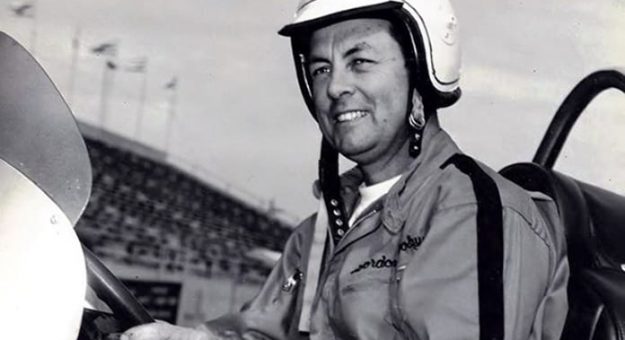National Sprint Car Hall of Fame inductee Gordon Woolley’s first involvement with motorsports was rolling jalopies for 10 bucks a flip at the Suicide Bowl in Waco, Texas.
That improbable initiation ultimately led to legitimate racing. Driving a 1934 Oldsmobile jalopy, Woolley reeled off 17 consecutive victories, resulting in a call to step up to modifieds and late models at Thunderbird Speedway in Crandall, Texas.
Content with running those cars, he’d settled into working in a garage and being a weekend warrior, until a 1959 trip to a sprint car race at Meyer Speedway in Houston transformed his life.
Woolley told the buddy he drove down with, “Man, that’s exactly what I want to do.”
His pursuit of that goal met with little luck. “I asked everybody for a ride,” Woolley said, describing his ceaseless efforts, “but they’d all say, ‘Boy, where the hell is Wack-o?’”
He didn’t give up.
“I had a friend in Florida named Flip Fritch,” recalled Woolley. “I asked him if he could help me get a ride. I was desperate to race sprint cars.”
“Flip” found a car for sale in Pennsylvania and loaned Woolley $2,500 to buy it. Woolley hauled to Pennsylvania in his ’58 Chevy, bought the car and headed home with a tank full of gas and $20. By the time he hit Iowa, he was flat broke. In Des Moines, he spotted a flyer promoting a sprint car race. He entered it, finished sixth and pocketed $50.
Woolley knew then sprint cars were his destiny.
He ran Devil’s Bowl Speedway and other dusty, rutty tracks throughout Texas, Kansas and Oklahoma, and in 1960 took the leap to the IMCA along with racing buddies Jim McElreath and Johnny Rutherford.
After Woolley captured the 1963 IMCA championship, USAC car owners pursued him. He answered their call only once.
“I got out of the car to get a drink of water,” quipped Woolley, explaining why he didn’t race USAC more. “And when I got back, the owner had another driver sitting in it.”
George Walther tested him at Indianapolis Motor Speedway in 1964. However, Woolley was an outlaw racer before outlaws were the thing, racking up 60,000 miles a year crisscrossing the country, catching the big-paying races and pursuing his passion.

And he switched cars as often as he did tracks. He confessed he’d never driven for a single car owner for a full season except in 1964 when he drove Hector Honore’s “Black Deuce.”
His 1963 IMCA championship year was typical of his car-hopping ways. He launched the season in Chet Wilson’s Chevy and won in Tampa. He then jumped into Jack Colvin’s former K.E.Y. car and took a series of CRA wins against Bobby Unser, Johnny Wood and other CRA regulars.
“I really wanted to beat those CRA guys,” he said. “They thought they were better than the rest of us.”
When Johnny White departed the IMCA for USAC in mid-season, Woolley switched to White’s Weinberger Home’s ride. With it, he won seven IMCA features and secured the series title.
That he managed seven wins in the car speaks volumes about his uncanny talent. Built by White, the Weinberger sprinter was lightweight and overpowered.
The number of sprint car features Woolley won has been lost in the records of defunct tracks and now nonexistent racing groups. It’s documented that he did post 37 IMCA feature wins, however.
Woolley earned his final sprint car victory in 1972 at Devils Bowl Speedway and retired from sprint cars the same year.
But he wasn’t finished racing.
Woolley returned to the cars and tracks where he launched his career, and in 1982 the 60-year-old won the stock car championship at Waco’s Heart-of-Texas Speedway. He continued racing well into the 1990s.
Besides being in the inaugural class of the Knoxville Raceway Hall of Fame, five other Halls of Fame have honored his accomplishments.
“I raced every kind of car there was,” Woolley said. “I’d go get a ride anywhere if there was a chance to make money. I loved it. I wouldn’t have done anything different.”
